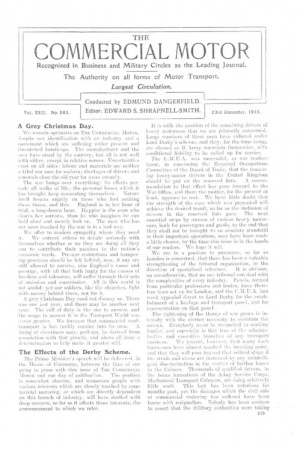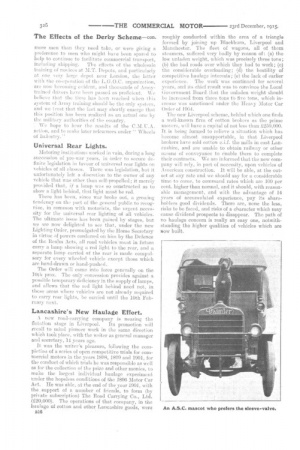Conducted by EDMUND DANGERFIELD. Editor: EDWARD S. SHRAPNELL-SMITH.
Page 1

Page 2

If you've noticed an error in this article please click here to report it so we can fix it.
A Grey Christmas Day.
1V,t remain optimists on THE COMMERCIAL MoToa, despite our identification with an industry and a movement which are suffering under present and threatened handicaps. The manufacturer and the user have stood by the country, but all is not well with either, except in relative senses. -Uncertainties exist on all sides: labour and materials are neither settled nor sure for makers; shortages of drivers and renewals close the old year for users uneasily.
The war hangs over everything: its effects pervade all walks of life; the personal losses which it hits brought keep reasserting themselves. Nature itself frowns angrily on those who feel nothing these tittles, and this. England is in her hour of trial, a long-drawn hour. Happier is the man who hares her sorrows, than he who imagines he can hold aloof and merely look on. The. man who has not been touched by the war is in a bad way.
We offer to readers sympathy where they need it. We entreat others to debate seriously with themselves whether or no they are doing all they can to contribute their maxima to the nation's economic needs. Pro-war restrictions and hampering practices should be left behind, now, if any are xtjll allowed to survive, else England's name and prestige, with all that both imply for the causes of freedom and tolerance, will suffer through their acts of omission and commission. All in this world is not sordid: yet our soldiers, like the churches, fight with. money behind them, not for it.
A grey Christmas Day need not dismay us. There was one last year, and there may be another next year. The call of duty is the one to answer, and the scope to answer it in the Transport World was never greater. We. forecast that commercial road transport is but tardily coming into its own. A lining of cheeriness may, perhaps, be derived from association with that growth, and above all from a determination to help make it greater still.
The Effects of the Derby Scheme. The 'Prime Minister's speech will be deli\ prod, in the House of Commons, between the time of our going to press with this issue of THE COMMERCIAL 7Aloatott and our day of publication. The position is somewhat obscure, and numerous people with various interests which are closely touched by commercial motoring, or which are directly dependent on this branch of .industry, will have studied with deep concern, so far as it affects those interests, the announcement to Whieb We refer.
It is with the position of the remaining drivers of heavy motorcars that we are primarily concerned. Large numbers of these men have enlisted under Lord Derby's scheme, and they, for the time being, are classed' as B Army reservists thereunder, with conditional liability to be called up for service.
The C.M.U.A. was successful, as our readers know, in convincing the -Reserved. Occupations Committee of the Board of Trade, that the remaining heavy-motor drivers in the United Kingdom should be put on the reserved lists. A recommendation to that effect has gone forward to the War Office, and there the matter, for the present at least, appeals to rest. We have little doubt that the strength of the case which was presented will achieve the desired result, so far as the inclusion of drivers in the reserved lists goes. The next essential steps by owners of various heavy motorcars, both for passengers and goods, to the end that they shall not be brought to an absolute standstili in their important operations, may have been made a little clearer, by the time this issue is -in the hands of our readers. We hope it will.
We are in a position to announce, so far as London is concerned, that there has been a valuable strengthening of the tribunal organization, in the
direction of specialized reference. It is obvious, on consideration, that no one tribunal ean deal with the complexities of every industry. Panels, formed from particular professions and trades, have therefore been set up for London, and the. C.M.-C.A. last week appealed .direct to Lord Derby for the establishment of a haulage and transport panel, and for representation on that panel.
The tightening of the thongs of war grows in intensity with the sterner necessity to maintain the sinews. Everybody must be reconciled to working harder, and especially is this true of the administrative. and executive branches of any transport
husincss. We protest, however, that many suelt
usir-K,sses have almost reached the breaking point, iind that they will pass beyond that critical stage ii the strain and stress are increased by any unintelligent diserimination in the matter of further losses to the Colours. Thousands of qualified drivers, in the home formations of the Anny Service Corps, Mechanical Transport Columns, are doing relatively little work, This fact. has been notorious for months past, yet the damages which the civil side of commercial motoring has suffered. have .been borne with resignation. Nobody has been anxious to assert that the thilitary authorities were taking more men than they need take, or were giving a preference to men who might have been spared to help to continue to facilitate commercial transport, including shipping. The effects of the wholesale training of novices at M.T. Depots, and particula:ly at one very large depot near London, the latter with the co-operation of the L.G.O.C. organization, • are now becoming evident, and thousands of Army trained drivers have been passed as proficient. We believe that the time has been reached when Otis aystem of Army training should be the only system, and we trust that the fact may shortly emerge that th:s position has been realized as an actual one by the military authorities of the country.
We hope to hear the results of the C.M.U.A. action, and to make later refewnee.s under `! Wheels of industry."
Universal Rear Lights.
Motoring institutions worked in vain, during a long succession of pre-war years, in hider to secure definite legislation in favour of universal rear lights on vehicles of all classes. There was legislation, but it unfortunately left a discretion to the owner of any vehicle that was other than self-propelled; it merely provided that, if a lamp was so constructed as to show a light behind, that light must be red.
There has been since war broke out, a growing tendency on the part of the general public to recognize, in common with motorists, the urgent necessity for the universal rear lighting o all vehicles. The ultimate issue has been gained by stages, but we ere now delighted to see that, under the new Lighting Order, promulgated by the Home Secretary in virtue of powers conferred on him by the Defence of the Realm Acts, all road vehicles must in future carry a lamp showing a red light to the rear, and a separate lamp carried at the rear is made compulsory for every wheeled vehicle except those which are hand-drawn or hand-pushed.
The Order will come into force generally on the 10th prole. The only concessionprovides against a possible temporary deficiency in the supply of lamps, and allows that the red light behind need not, in these areas where vehicles are not already required to carry rear lights, be carried until the 10th February next.
Lancashire's New Haulage Effort.
A new road-carrying company is nearing the flotation stage in Liverpool. Its promotion will recall to mind pioneer work in the same direction which took place, with the writer as general manager and secretary, 11 years ago.
It was the writer's pleasure..., following the cornpletioa of a series of open competitive trials for commercial motors in the years 1898, 1899 and 1901, for the conduct of which trials he was responsible as well as for the collection of the prize and other monies, to make the largest individual haulage experiment tinder the hopeless conditions of the 1800 Motor Car Act. lie was able, at the end of the year 1901, with the support of a number of friends, to form (by private subscription) The Road Carrying Co., Ltd. (12.0,000). The operations of that company, in the haulage of cotton and other Lancashire goods, were B16. roughly conducted within the area of a triangle formed by joining up Blackburn, Liverpool and Manchester. The :fleet of wagons, all of them steamers, suffered very badly by reason of : (a) the low unladen weight, which was precisely three tons; (h) the bad roads over which they had to work; (c) the considerable overloading; (d) the hostility of competitive haulage interests'; (e) the lack of earlier experience. The work was continued for several years, and its chief result was to convince the Local Government Board_that the unladen weight should be increased from three tons tb five tons, which increase was sanctioned under the Heavy Motor Car Order of 1904.
The new Liverpool scheme, behind which one finds a well-known firm of cotton brokers as the prime movers, will have a capital of not less than £250,000. It. is being formed to relieve a situation which has become almost Unsupportable, in that Liverpool brokers have sold cotton c.i.f. the mills in east Lancashire, and are unable to obtain railway or other means of conveyance to enable them to complete their contracts. We are informed that the new company will rely, in part of necessity, upon vehicles of American construction. It will be able, at the outset at any rate and we should say for a considerable time to come, to command rates which are 100 per cent. higher than normal, and it should, with reasonable management, and with the advantage of 14 years oi accumulated experience, pay its shareholders good dividends. There are, none the less, risks to be faced, and risks ofa character which may cause dividend prospects to disappear. The path of no haulage concern is really an easy one, notwithstanding the higher qualities of vehicles which are Now built.








































